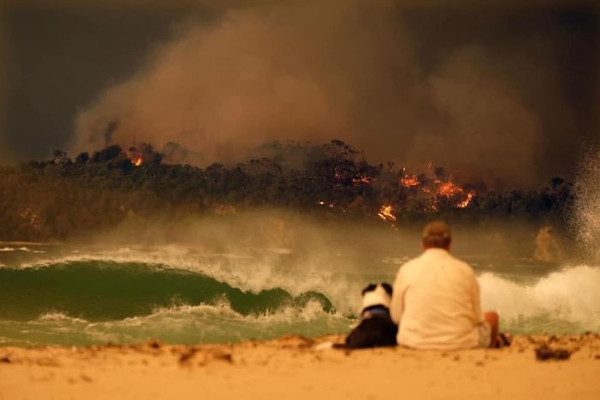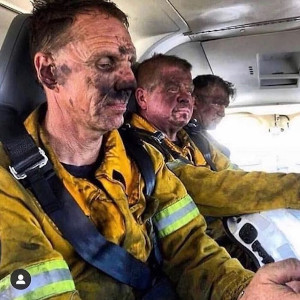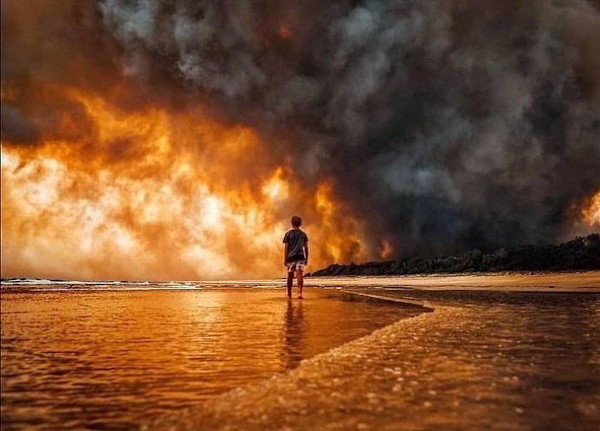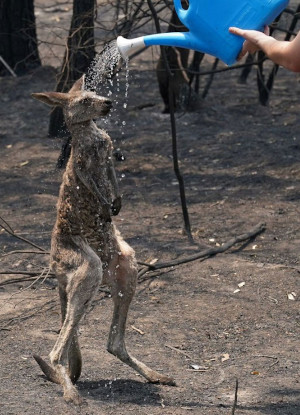Latest Contributions
Bushfires in Australia: the future confronts the past

Dr. R.F.I. Smith is from Yorke Valley in central Yorke Peninsula in South Australia. Known to his friends as Bob, he has worked as a public servant in three states in Australia. He has also conducted research on public policy and management in Australia and, more recently, in India.
After studying at the University of Adelaide, Bob graduated with a PhD in political science at Australian National University in 1970. He has worked in Australia in Universities, the public service and as a consultant in public sector management. He was until recently an Adjunct Professor at RMIT University (School of Management).
Bob has taught public policy and management at graduate level and conducted consulting assignments for a number of state and federal public service agencies. He has also consulted and participated in workshops in India, Bangladesh, Vietnam, Malaysia, Indonesia, China, Korea and Niue.
He visited India as a student in 1964. In 1972 Bob spent six months at the University of Rajasthan. More recently, he has been a regular visitor to Delhi, Varanasi (where he has studied Hindi) and Jaipur.
Editor's note: Dr. R.F.I. Smith currently lives in Victoria, Australia where, from October 2019 to January 18, 2020, bushfires have scorched more than 25.5 million acres of land, killed dozens of people, caused scores to be evacuated, and forced hundreds to be shipped / airlifted out of Mallacoota, a popular holiday spot.

Man and dog watch a bushfire in Australia literally burn their world. Photo credit: Alex Coppel.
Australia’s bushfires have landed its people and governance system with a set of problems that as a nation we have been trying to avoid for nearly a decade. How do we live with bushfire seasons that are getting longer, droughts that are getting more severe and forests and vegetation that are getting drier? How much can we do on our own, as individuals, communities and governments? How much do we need to collaborate with other countries? And what will it take to construct meaningful policies to mitigate the effects of a changing climate?
In Australia how one poses such questions is controversial. This note therefore begins with my standpoint. It then sketches some of the issues raised by the present tragedy.
My standpoint includes memories, work experience and,until recently, time living in the country. Memories start with hot, dry summers in South Australia. Our family had a grain and sheep farm on Yorke Peninsula, a productive agricultural district developed in the 1870s. Harvest time was the season for crop and stubble fires, especially started by poorly maintained farm machinery.
Fire prevention began at seeding time with ploughing fire breaks around each paddock of crop. It continued with freshening up fire breaks around the house and sheds. It finished with checking machines before harvest and putting tanks of water on the truck. When fires broke out nearby farmers rushed their trucks to the site. A line of trucks with pumps usually put out stubble fires before they got away.
On the peninsula big fires were rare. Most of the land was in crop or pasture. It was easily accessible. But fires were feared. In other parts of the state big fires were regular, especially in the hills near the state capital of Adelaide. This year fires on the peninsula have been more numerous and more serious. They have started not from machinery failure (harvest was already over) but from dry lightning. They have threatened property and towns. And they have been harder to put out.
Work experience included several years in the 1990s in a state primary industries department.It had a large program of agricultural research. One scientist specialised in climate science, a recent addition to the program. Senior managers paid particular attention to his briefings. One day, talking about the possibility of climate change, he said, almost under his breath, ‘I think it’s on’. For many of us the impacts of climate change then became very important in planning the work of the department.
In retirement in Victoria we lived for many years in a small settlement away from towns. It was close to the Otway Ranges, a forested area in the south west of the state. Fortunately in our time there no fires occurred. However I did join the local volunteer fire brigade and served as a non-operational member doing odd jobs in the truck shed.

Thousands of firefighters have battled the bushfires burning across Australia that have scorched an area the size of South Korea. Photo credit: Pip Magazine - Australian Permaculture.
The brigade was part of the Country Fire Authority, a volunteer service set up after tragic fires in 1939, including close to the site of our settlement. The operational volunteers had extensive experience in hazard reduction burning and in laying long hoses to fight fires in inaccessible countryside nearby. The fires they were called out for were usually short and sharp. However while they were glad to serve they made clear the stresses and strains of being in action even for short periods.
For these reasons, for me, fire is an expected part of living in Australia. Its incidence has become more severe. We cannot expect arrangements as usual to continue to be effective.A major review into climate change a decade ago foreshadowed lengthening drier periods and seasons. Researchers who study climate science and bushfires have concluded that ‘Australia’s climate has warmed since the 1970s, fire weather conditions have become more extreme, and the length of the fire season has increased across large parts of the nation (https://theconversation.com/some-say-weve-seen-bushfires-worse-than-this...).
While emissions from Australia are relatively small, we are high per capita emitters. Globally, average temperature rises above pre-industrial levels have been estimated at 1.1C. For Australia the number is 1.4C. Such estimates are properly subject to informed critique. The severity of the current fires is reason to refine or correct them and to investigate hypothesised drivers of change.
Raw information about the current fires makes clear the magnitude of the problem. Fires started in September 2019, more than a month earlier than usual in the southern states. In the southern states the fire season can extend at least into March. The drought has clearly extended the current season.

A boy, having fled his home, watches a bushfire burn. Photo credit: Martin von Stoll.
Fires have hit all states. They run in a broken line down the east coast from southern Queensland to eastern Victoria. There are fires too in Tasmania, Western Australia and South Australia. Some fires have joined up in mega fires. Others have joined across state borders. Melbourne, Sydney and Canberra have had days blanketed in smoke. Smoke has drifted to New Zealand. It is expected to drift around the world. Even after rain, many fires still burn.
Direct impacts have been severe. Forests that have not burnt before, including remnant Gondwana land rainforests, have been badly hit. Many native animals have been killed. Thirsty koalas, normally sitting high in trees eating leaves, have been on the ground slurping water even from hand held bottles. Sheep and cattle have suffered badly. In South Australia approximately half of Kangaroo Island, including native animal habitat and pastoral land, has burnt.

A boy gives water to a kangaroo impacted by the bushfires. Photo credit: Matrix for Daily Mail Australia.
While loss of human life has been limited, property damage has been extensive. Towns have been cut off. Power supplies and communications, including by mobile phone have been disrupted. In beach holiday towns, full with summer holiday makers, people have had to seek refuge on beaches and jetties. Essential supplies have run short. At times of peak danger, mandatory evacuations were ordered. Early estimates put the overall cost of the fires at approximately AU$100 billion. For individuals and families the immediate dollar cost is just the beginning of the material, psychological and social costs they will bear.
The primary responsibility for fire management, including prevention as well as emergency response, lies with state governments. In most states professional fire fighters look after urban areas and volunteers play large roles in rural areas. There are also specialist fire- fighting organisations for national parks and state forests. Many fires start in hilly areas that are hard to get to. For this reason water bombing aircraft have increasing roles. However we tend to lease aircraft from North America. A problem is that as the fire season there gets longer the aircraft are no longer available. Further, while North American firefighters, along with firefighters and other emergency workers from many other countries, have come to Australia, extra aircraft have been hard to lease. State Premiers and governments have been quick off the mark with deployment of resources. They have also supported fire chiefs at regular operational briefings, broadcast live and circulated on social media.
However the federal government has equivocated. The Prime Minister declined to hear warnings from retired fire chiefs about the potential for a catastrophic fire season. Whatever preparations were made for a national coordinating role were low key. The Prime Minister said repeatedly that managing fires was primarily a matter for the states. However as fires worsened he came back from an ill-timed international holiday to call out military reservists and pledge money for recovery. Subsequently navy ships and military helicopters evacuated a cut off holiday town. The army started clearing roads.
Much of the immediate burden of relief fell on community groups and volunteers. City charities and welfare groups were quick off the mark. Sikh and Muslim communities were among those who traveled to hard hit areas to help feed displaced residents. However local communities had to rely heavily on their own resources. Tales of local heroism and quiet and generous courage are testament to their efforts.
With heavy falls of rain some of the worst fires have abated. However the work of fire fighting continues. The task of recovery has barely begun. The task of learning from the events not only of the last weeks but also of the extensive history of fires in Australia is made difficult because of a toxic national dispute over climate change. The current federal government abolished legislation setting a price on carbon and cut back climate research.
The Prime Minister argues that the severity of the fires resulted from a lack of clearing in forested areas. He wants to focus on ‘practical’ steps. He wants more hazard reduction burning. However leaders of fire-fighting agencies argue that hazard reduction burning is only one tool among many. They contend also that with changing fire seasons opportunities for safe burning, including near houses and sheds where it is most effective in protecting property, are reducing.
Australian politics is played rough and low. A focus on short term costs gets a ready audience. A focus on long term costs of inaction and long term benefits gets a yawn. The temptation to hope that rain and recovery will wash away the problems of this fire season, whenever it ends, are strong. However the questions posed at the outset cannot be wished away. To answer them many other questions will also need to be confronted. These include ones about our dependence on fossil fuels domestically for power generation and internationally for export income. So too will the local implications of momentum in favour of investments in renewable energy and away from the coal industry.
Transition plans domestically and internationally will be as challenging as they are now essential. We need to get our act together at home. But because we have an open economy and rely on exports of services and commodities, in getting our own act together we need to be extraordinarily mindful of the priorities of other countries.
Comments
Bush fires in Australia
Very sad to learn about the catastrophic situation. Hope and all the concerned agencies will come together and get the much needed relief to people.
Fire away
A great account. Sorry to read that Australia is suffering.
Add new comment